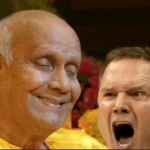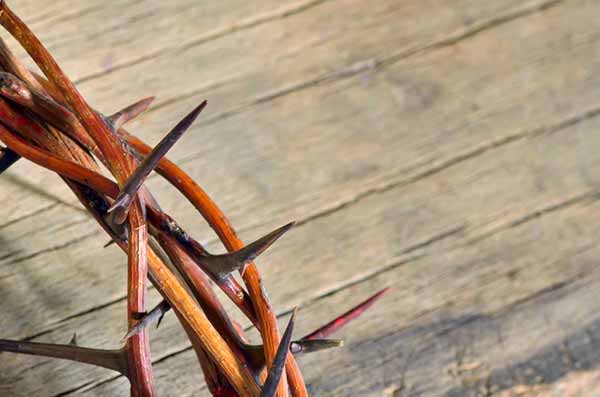“Die blymoedige mens se hele lewe is ’n fees” (Prov 15:15) Blydskap laat ‘n mens se gesig straal; smart maak ‘n mens terneergedruk. (Prov 15:13) ‘n Vrolike mens is ‘n gesonde mens, ‘n neerslagtige mens raak uitgeput. (Prov 17:22) Die Bekende KIPP Skole baseer onder andere hulle sukses met kinders deur te fokus om die kinders se “zest” passie te ontwikkel. Gelukkige en “happy” kinders leer makliker. Hulle droom is om 100% van alle leerders te laat kwalifiseer vir Nagraadse Studies. https://www.youtube.com/watch?v=lAsSdyb6YMY&app=desktop
Scientists have been studying the effect of laughter on human beings and have found, among other things, that laughter has a profound and instantaneous effect on virtually every important organ in the human body. Laughter reduces health-sapping tensions and relaxes the tissues as well as exercising the most vital organs. It is said that laughter, even when forced, results in beneficial effect on us, both mentally and physically. Next time you feel nervous and jittery, indulge in a good laugh. —Executives’ Digest[i]
Die Here wil nie hê ons moet Hom dien soos slawe sonder vreugde nie. Deut 28:47 Daarom was die Joodse Kalender gevul met 7 feeste. God wil hê ons moet kan feesvier! (Ezra 6:22)
Jesus was so ‘n vrolike blymoedige mens. (Luk 10:21) “rejoiced in spirit” (agalliō) – to leap. To exult, leap for joy, to show one’s joy by leaping and skipping denoting excessive or ecstatic joy and delight. Hy het die krag van vreugde in die Gees verstaan, en dit het Hom die krag te gee om Sy lyding te ontbeer. (Heb 12:2) Hy het geleef vanuit ‘n intieme verhouding met die Vader, wetende dat die Vader Sy gebede antwoord. (Joh 11:41-42) Hy het die guns ontvang van die Vader. (Mat 3:17) Die Vader het hom verheerlik (Joh 8:54) Sy verhouding met die Vader, en gehoorsaamheid aan die Vader, was die bron van Sy vreugde. “the joy of the Lord is your strength.” (Neh 8:10) Sien die klem in hierdie vers. Sy vreugde gee ons krag. Soos ‘n man krag kry uit sy vrou wat gelukkig is, kry ons krag wanneer ons weet ons lewe behaag die Here.
Alhoewel Jesus ‘n man was wat lyding en pyn geken het, het Hy nogtans met vreugde gelewe. Sondaars was aangetrek na Hom en onthou hulle is nie juis bekend dat hulle die ernstige, gewyde, hoog heilige mense opsoek nie! Jesus se gelykenisse, en teenvraag stellings, wys op sy fyn sin vir humor.
Een van my gunsteling outeurs John Eldredge beskryf Jesus op die volgende manier vanuit die perspektief van die natuur wat van Hom getuig in sy boek Beautiful Outlaw.
I was sitting out back yesterday morning sipping coffee, watching the young chipmunks chase one another at breakneck speeds across the deck. One clever daredevil, hoping to get the advantage, jumped up on the fence rail and continued the chase from above, leaping at the last moment upon his littermate like a Hollywood stuntman. This morning one of them adopted a new strategy. The little rascal found an ambush spot, clinging from the side of the house, where he waited for his playmate to wander by unawares; he then pounced, and the two somersaulted off the deck and into the grass, squealing. Only to dash off and do it again. And again. Now—what does this tell us about the personality of Jesus, who created these little dynamos with striped masks and boundless enthusiasm? What do they say about his heart? Polar-bear cubs will hurl themselves down snowy hillsides headfirst and upside down, just for fun. Spinner dolphins love to romp in the bow-wake of a boat, cavorting, leaping into the air and, well, spinning. Otters play tag. Our horses play tug-of-war with a stick—which is really quite funny when you think of how nobly a horse normally likes to carry himself. [ii]
HOE ONTVANG EN LEEF JY IN HIERDIE BLYMOEDIGHEID?
Ons verbondenheid met Christus, die Vader en die Heilige Gees – (Joh 15:11-12) Dit sê Ek vir julle sodat my blydskap in julle kan wees en julle blydskap volkome kan wees. Dit is my opdrag: Julle moet mekaar liefhê soos Ek julle liefhet. Ons verbondenheid met Jesus gee ons ewige vreugde. Soos ‘n wingerdtak in die boom ingeënt is, en sy lewe ontvang van die boom, so leef ons in Christus. Maar ons kan nie in die boom ingeënt wees sonder dat ons outomaties nie ook in mekaar ingeënt is nie. Vergelyk (Col 1:27) in die ou vertaling en die nuwe vertaling: Christus IN en Onder ons.
Ons verbondenheid met mekaar in Sy liggaam – Todd Adkins post op sy Twitter blad: “Geen mens kan Jesus alleen volg nie.” Ware Apostoliese leiers soos Johannes se teenwoordigheid het sy vriende en medegelowiges se harte met vreugde gevul. (2 Joh 1:12) In Johannes se eerste Brief weerklank hy Jesus se gebed in Joh 17:21 “Hom wat ons gesien en gehoor het, verkondig ons aan júlle, sodat julle aan ons gemeenskap deel kan hê. En die gemeenskap waaraan ons deel het, is dié met die Vader en met sy Seun, Jesus Christus.” (1 Joh 1:3-4) Dit skryf ons sodat ons blydskap volkome kan wees. John Piper volg dieselfde gedagterigting wanneer hy verduidelik dat dissipels-maak eintlik ‘n korporatiewe en groeps-gebeurtenis is. Want jy word deel van die “Jesus” groep.
Sy tasbare teenwoordigheid en heerlikheid – Deur ons verhouding en intimiteit met die Vader behou ons die vreugde. Hy is vreugde! Sy teenwoordigheid is loutere vreugde en ekstase!
ekstase = ecstasy, rapture
(Ephesians 5:18) Nie dronk van wyn nie, maar dronk/gevul met die Heilige Gees.
Full of joy, filled with HS. (Acts 13:52) vergelyk (Acts 2:2) Die uitstorting van die Heilige Gees.
Shekhinah “that which dwells” the radiance, glory or presence of God dwelling in the midst of his people, is used by Targumist and Rabbi to signify God himself, for legal Judaism dislikes ascribing form or emotion to deity.[iii] It refers to the instances when God showed Himself visibly, as, for example, on Mount Sinai (Ex. 24:9–18) and in the Holy of Holies of the tabernacle and in Solomon’s Temple.[iv] This term is not found in the Bible. It was used by the later Jews, and borrowed by Christians from them, to express the visible majesty of the divine Presence, especially when resting or dwelling between the cherubim on the mercy-seat in the tabernacle and in the temple of Solomon[v] The Shekinah, nearest Jewish equivalent to the Holy Spirit,[vi]
Early Christian Prophetic Ecstasy The early church included an element of ecstatic prophecy. John describes his ecstatic encounter in stating, “I was in the spirit on the Lord’s day” (Rev 1:10 NRSV). This incident and others that he recounted involved an out-of-body experience during which John had visions into the heavenly realm and received instructions and revelations from God and/or the exalted Christ. Peter (Acts 11:5) and Paul (2 Cor 12:1–7) had similar ecstatic experiences.[vii]
Eugene Peterson says that the Hebrew root word for “prosperity” is more accurately translated “leisure”—“ the relaxed stance of one who knows that everything is all right because God is over us, with us and for us in Jesus Christ.” [viii]
Vrug van Sy karakter permanent in ons – Blydskap is deel van die vrug van die Gees. En die vrug is enkelvoud. Die primêre vrug is liefde! Al die ander 8 vrugte is ‘n voortvloeisel van liefde. Vergelyk (1 Cor 13:3-4), Liefde is geduldig, vriendelik ens. Blydskap, vreugde, vrolikheid is ‘n inherente eienskap van liefde. Daar is net hoofsaaklik 2 primêre emosies wat ons as mens beleef, of liefde of vrees. Woede/wraak/haat is die hoogste emosie van vrees: Euforiese sprankelende, huppelende, vreugde is die hoogste emosie van liefde! Om met God versoen te wees, en met Hom reg te wees – bring vrede en vreugde in die Heilige Gees. (Rom 8:17)
BLYDSKAP ROWERS:
Hierdie eenwording met Hom en met mekaar, is net moontlik as ‘n mens se hart heeltemal skoon is van “Offense”. Ons afrikaners sukkel maar met dié woord die woordeboek vertaal “offense” as volg: Gebelgd, gekrenk, beledig voel, gesteurdheid, afgehaal, gekwets, geraaktheid. Luk 17:1-5 leer ons die stappe om met iemand te maak wat jou te na kom. Hoe meer jy hierdie stappe volg, hoe sterker word jy, en hoe minder voel jy te na gekom.
BLYDSKAP EN VROLIKHEID IS ‘N WAPEN IN ONS GEESTELIKE ARSENAAL
- Vreugde gee ons krag tydens verdrukking. In al ons sorge is ek vol moed en oorstelp van blydskap. 2 Corinthians 7:4
- Mag God, die bron van hoop, julle deur julle geloof met alle vreugde en vrede vervul, sodat julle hoop al hoe sterker kan word deur die krag van die Heilige Gees! (Romans 15:13–14) Vreugde versterk jou geloof. Hoop en vreugde is vennote. Joy is the keeper and vehicle of hope. Joyful expectation of hope. Vreugde hou jou in die atmosfeer van geloof, hoop en die bonatuurlike!
- Vreugde maak ons beter getuies van Sy lewe. Jesus se vertelling van gelykenisse en slim humor het sy luisteraars ontwapen om met ‘n vars oor en oop hart te luister. ‘n lewendige, opgewekte, en opgeruimde onderwyser sal nie sukkel om sy of haar kinders se aandag te kry nie.
- Innerlike vreugde en vrolikheid is ‘n teenmiddel teen verslawing. Iemand wat innerlike vreugde beleef gaan nie probeer om dit chemies aan te vul of te kry nie. Jy is vol!
- Vreugde ontlont moeilike situasies. Dink maar hoeveel keer ‘n bietjie humor op die regte tyd, ‘n argument met jou huwelikmaat ontlont het.
WAT VREUGDE EN VROLIKHEID NIE IS NIE.
Dit nie sarkasme nie, ek lag vir jou.
Dit is nie ligsinning nie.
Dit is nie onkenning nie. Onkenning is ‘n vorm van “presumptuous” geloof. Jy het nie ‘n sekre Woord van God nie, maar wens maar net dat die probleem self sal verdwyn. Nou maak mens grappies en deel nie met die kern van ‘n probleem nie.
INSPIRASIE!
‘n pragtige voorbeeld van die krag van ‘n positiewe uitkyk op die lewe en die krag van blydskap is die film “Life is beautiful”. Rick Lawrence verduidelik dit pragtig in sy boek Shrewd.
Pain is a predator, and all of us have felt its bite—some have been eaten alive by it. But laughter raises its fist to a corrupted world and proclaims, “This cannot destroy me!” This is, in the end, the message delivered in the 1997 Oscar-winning foreign film Life Is Beautiful. In the film a Jewish-Italian man named Guido (played by writer/ director/ actor Roberto Benigni) uses laughter to help his four-year-old son survive a Nazi concentration camp. He convinces his son that the camp is just an elaborate game, and that the boy will win an actual tank if he’s the first child to earn one thousand points. He will lose points, explains Guido, if he cries, complains about missing his mother, or begs for food. Despite his stark and horrific surroundings, the boy believes his dad’s version of reality—the killing factory becomes his playground. In the end, as American liberators are closing in on the camp, Guido is caught trying to find his wife and led off by Nazi guards to be shot. He sees his son watching as he’s taken away, so he mimics and satirizes the guard as he marches behind him, to the delight of his son. The father is killed, but the son and the mother survive. Later, when the boy is old enough to understand what happened, he realizes that his father’s shrewd sense of humor saved his life. [ix]
George Mueller would not preach until his heart was happy in the grace of God; Ian Ruybroeck would not write while his feelings were low, but would retire to a quiet place and wait on God till he felt the spirit of inspiration. It is well-known that the elevated spirits of a group of Moravians convinced John Wesley of the reality of their religion, and helped to bring him a short time later to a state of true conversion. The Christian owes it to the world to be supernaturally joyful. —A. W. Tozer[x]
Nog verdere Skrifgedeeltes:
Ps 63:5; 66:1; 89:15; 96:12; 149:5-6




